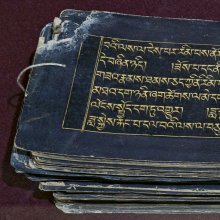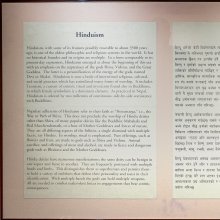Akshara, Akṣarā, Akṣara, Akṣāra, Ākṣāra: 33 definitions
Introduction:
Akshara means something in Buddhism, Pali, Hinduism, Sanskrit, Jainism, Prakrit, the history of ancient India, Marathi, Hindi. If you want to know the exact meaning, history, etymology or English translation of this term then check out the descriptions on this page. Add your comment or reference to a book if you want to contribute to this summary article.
The Sanskrit terms Akṣarā and Akṣara and Akṣāra and Ākṣāra can be transliterated into English as Aksara or Akshara, using the IAST transliteration scheme (?).
Images (photo gallery)
(+1 more images available)
In Hinduism
Vaishnavism (Vaishava dharma)
Source: humindian: 108 names of Lord KrishnaOne of the 108 names of Krishna; Meaning: "Indestructible Lord"

Vaishnava (वैष्णव, vaiṣṇava) or vaishnavism (vaiṣṇavism) represents a tradition of Hinduism worshipping Vishnu as the supreme Lord. Similar to the Shaktism and Shaivism traditions, Vaishnavism also developed as an individual movement, famous for its exposition of the dashavatara (‘ten avatars of Vishnu’).
Ayurveda (science of life)
Rasashastra (Alchemy and Herbo-Mineral preparations)
Source: Wisdom Library: Rasa-śāstraAkṣarā (अक्षरा):—One of the sixty-four Divyauṣadhi, which are powerful drugs for solidifying mercury (rasa), according to Rasaprakāśa-sudhākara (chapter 9).

Āyurveda (आयुर्वेद, ayurveda) is a branch of Indian science dealing with medicine, herbalism, taxology, anatomy, surgery, alchemy and related topics. Traditional practice of Āyurveda in ancient India dates back to at least the first millenium BC. Literature is commonly written in Sanskrit using various poetic metres.
Purana and Itihasa (epic history)
Source: archive.org: Shiva Purana - English Translation1) Akṣara (अक्षर) refers to “imperishable”, according to the Śivapurāṇa 2.3.8.—Accordingly, Himavat said to Nārada:—“[...] The supreme Brahman is great and imperishable [i.e., akṣara]. It is like the streak of a lamp. It is termed Sadāśiva. It is without aberration. It is beyond Brahmā. It is both full and devoid of qualities. It has no special traits, no desires. It sees within and not without. O sage, from the Kinnaras who come here, such are the things heard about Him. Can it be untrue?”.
2) Akṣara (अक्षर) refers to the “(sweet) tones (made by the instrument players)”, according to the Śivapurāṇa 2.3.46 (“The arrival of the bridegroom”).—Accordingly, as Brahmā narrated to Nārada: “[...] The instrument players played on musical instruments in sweet tones (madhura-akṣara) showing their diverse skill. The delighted Himācala too carried out the customary rites of reception at the entrance. Menā also jubilantly took part in the same along with all the womenfolk. [...]”.
3) Akṣara (मकार) refers to the “(letters of the) alphabet”, according to the Śivapurāṇa 2.5.2 (“The Prayer of the gods).—Accordingly, as the Gods eulogized Śiva: “[...] Among the burning ones (pratāpin), you are the fire, among the devotees of Śiva, you are Viṣṇu, among Purāṇas you are Bharata; among the letters of the alphabet (akṣara) you are the letter Ma. Among the Bījamantras you are the Praṇava; among the terrible ones you are poison; among the pervading ones you are the firmament; among the Ātmans you are the supreme Ātman. [...]”.
Source: Cologne Digital Sanskrit Dictionaries: The Purana Index1a) Akṣara (अक्षर).—Father of Suyajña.*
- * Brahmāṇḍa-purāṇa III. 70. 23.
1b) An epithet of Hari—(ety.)1 is Brahma.2
1c) Rises out of the neck of Brahmā in the contemplation of creation.1 A system of letters formed by Brahmā.2
1d) A term for mahān.*
- * Vāyu-purāṇa 102. 21.

The Purana (पुराण, purāṇas) refers to Sanskrit literature preserving ancient India’s vast cultural history, including historical legends, religious ceremonies, various arts and sciences. The eighteen mahapuranas total over 400,000 shlokas (metrical couplets) and date to at least several centuries BCE.
Natyashastra (theatrics and dramaturgy)
Source: Wisdom Library: Nāṭya-śāstra1) Akṣara (अक्षर) refers to a “stroke” in musical notes, according to the Nāṭyaśāstra.
2) Akṣara (अक्षर) refers to “sixteen syllabic sounds” and represents one of the rules one of playing drums (puṣkara) [with reference to Mṛdaṅga, Paṇava and Dardura] according to the Nāṭyaśāstra chapter 33. Accordingly, “K, kh, g, gh, ṭ, ṭh, ḍ, [ṇ], t, th, d, dh, [m], r, l, and h are the sixteen syllabic sounds. These are the always to be used in the vāṣkaraṇa of the puṣkara music”.
Source: Shodhganga: Mankhaka a sanskrit literary genius (natya)Akṣara (अक्षर, “syllable”).—A verse in Sanskrit is of four feet or quarters or pādas. Each pāda is regulated either by a number of syllables (akṣaras) or by a number of syllabic instant or measures (mātrās). The metres regulated by akṣaras are called vṛttas and those regulated by mātrās are called jātis. A vṛtta is divided into three classes viz. samavṛtta, ardhasamavṛtta, and viṣamavṛtta. Again, yati or pause or caesura is a part of a verse, at which the reader is required to stop his breath and then proceed on.

Natyashastra (नाट्यशास्त्र, nāṭyaśāstra) refers to both the ancient Indian tradition (shastra) of performing arts, (natya—theatrics, drama, dance, music), as well as the name of a Sanskrit work dealing with these subjects. It also teaches the rules for composing Dramatic plays (nataka), construction and performance of Theater, and Poetic works (kavya).
Vyakarana (Sanskrit grammar)
Source: Wikisource: A dictionary of Sanskrit grammarAkṣara (अक्षर).—A letter of the alphabet, such as a (अ) or i (इ) or h (ह) or y (य् (y)) or the like. The word was originally applied in the Prātiśākhya works to vowels (long, short as also protracted), to consonants and the ayogavāha letters which were tied down to them as their appendages. Hence अक्षर (akṣara) came later on to mean a syllable i. e. a vowel with a consonant or consonants preceding or following it, or without any consonant at all. cf. ओजा ह्रस्वाः सप्तमान्ताः स्वराणामन्ये दीर्घा उभये अक्षराणि (ojā hrasvāḥ saptamāntāḥ svarāṇāmanye dīrghā ubhaye akṣarāṇi) R Pr. I 17-19 cf.एकाक्षरा, द्व्यक्षरा (ekākṣarā, dvyakṣarā) etc. The term akṣara was also applied to any letter (वर्ण (varṇa)), be it a vowel or a consonant, cf, the terms एकाक्षर, सन्ध्यक्षर, समानाक्षर (ekākṣara, sandhyakṣara, samānākṣara) used by Patañjali as also by the earlier writers. For the etymology of the term see Mahābhāṣya अक्षरं न क्षरं विद्यात्, अश्नोतेर्वा सरोक्षरम् । वर्णे वाहुः पूर्वसूत्रे । (akṣaraṃ na kṣaraṃ vidyāt, aśnotervā sarokṣaram | varṇe vāhuḥ pūrvasūtre |) M. Bh. Āhnika 2 end.

Vyakarana (व्याकरण, vyākaraṇa) refers to Sanskrit grammar and represents one of the six additional sciences (vedanga) to be studied along with the Vedas. Vyakarana concerns itself with the rules of Sanskrit grammar and linguistic analysis in order to establish the correct context of words and sentences.
Chandas (prosody, study of Sanskrit metres)
Source: Shodhganga: a concise history of Sanskrit Chanda literatureAkṣara (अक्षर) is one of the general characteristics of the Vedic Metres (chandas).—The Vedic Metres are calculated by syllables (akṣaras). Each pāda is made of a specific number of syllables. A syllable is a vowel or a vowel with consonant or with anusvāra. A pāda may consist of different numbers of syllables viz. five, six, seven, eight, ten, eleven, or twenty syllables. According to this principle, a word is not found to be split.

Chandas (छन्दस्) refers to Sanskrit prosody and represents one of the six Vedangas (auxiliary disciplines belonging to the study of the Vedas). The science of prosody (chandas-shastra) focusses on the study of the poetic meters such as the commonly known twenty-six metres mentioned by Pingalas.
Shaktism (Shakta philosophy)
Source: Google Books: Manthanabhairavatantram1) Akṣara (अक्षर) refers to the “imperishable” which is associated with Pūrṇagiri, one of the sacred seats (pīṭha), according to the Manthānabhairavatantra, a vast sprawling work that belongs to a corpus of Tantric texts concerned with the worship of the goddess Kubjikā.—These triads [i.e., Parā, Parāparā and Aparā] delineate the encompassing body of the goddess, which is wrapped around the Supreme Energy (parakalā) in the centre represented by the seat Oḍḍiyāna. The fifth seat, Tisra, is above the Triangle in the form of a Point (bindu) that contains all the energies of the Triangle of seats [i.e., Oḍḍiyāna, Pūrṇagiri and Kāmarūpa]. The Wisdom Sūtra, which follows the Root Sūtra in chapter 26 and comments on it, explains that these five correspond to: 1) Oḍḍiyāna—Bliss (ānanda), 2) Jālandhara—Drop of Bliss (ānandabindu), 3) Pūrṇagiri—the Imperishable (akṣara), 4) Kāmarūpa—the Supreme Energy (paramā), and 5) Tisra—(pure) Energy (kalā). In order to reach the more stable grouping of six that can be related to the sixfold Krama, these five are understood to be Kula pervaded by Kaula, the sixth, which consists of Śiva and Śakti. Beyond Tisra, this is the seat called Candra or Koṅkaṇa.
2) Akṣara (अक्षर) is the name of a Pallī (village) associated with the Pīṭha named Dakṣiṇādi, according to the Kulakriḍāvatāra, a text paraphrased by Abhinavagupta in his Tāntrāloka.—The lineage (ovalli) Yogin is associated with the following:—Prince: Vindhya; Master: Śāṇḍilyamuni; Pīṭha: Dakṣiṇādi; Ghara (house): Śarabilla; Pallī (village): Akṣara; Town: Piṇḍa; Direction: south-west; Grove: Khaira; Vow-time: 25 years; Mudrā: right little finger; Chummā: “Navel”.

Shakta (शाक्त, śākta) or Shaktism (śāktism) represents a tradition of Hinduism where the Goddess (Devi) is revered and worshipped. Shakta literature includes a range of scriptures, including various Agamas and Tantras, although its roots may be traced back to the Vedas.
Kama-shastra (the science of Love-making)
Source: Shodhganga: Elements of Art and Architecture in the Trtiyakhanda of the Visnudharmottarapurana (kama)Akṣara (अक्षर) or Akṣarakrīḍā refers to the “playing of akṣara” (a kind of dice-game) and represents one of the “sixty four kinds of Art”, according to the Kāmasūtra of Vātsyāyaṇa.—Indian tradition, basically includes sixty four Art forms are acknowledged. The references of sixty four kinds of kalā are found in the Bhāgavatapurāṇa, Śaiva-Tantras, Kāmasūtra of Vātsyāyaṇa etc.

Kamashastra (कामशास्त्र, kāmaśāstra) deals with ancient Indian science of love-making, passion, emotions and other related topics dealing with the pleasures of the senses.
Yoga (school of philosophy)
Source: ORA: Amanaska (king of all yogas): A Critical Edition and Annotated Translation by Jason BirchAkṣara (अक्षर) refers to the “imperishable one”, according to the Bṛhadāraṇyikopaniṣat 3.8.6, 8.—Accordingly, while describing the absolute nature of Brahma: “Gārgi said, ‘Yājñavalkya, that which is above the sky, below the earth, between the two and called [past, present and future], is stitched and cross-stitched in what?’ Yājñavalkya said, ‘Gārgi, the Brahmins call that very [thing] the imperishable one (akṣara). [It is] not coarse, not particulated, not short, not long, bloodless, unlubricated, shadowless, undarkened, windless, spaceless, unattached, tasteless, scentless, invisible, inaudible, speechless, mindless [...]’”.

Yoga is originally considered a branch of Hindu philosophy (astika), but both ancient and modern Yoga combine the physical, mental and spiritual. Yoga teaches various physical techniques also known as āsanas (postures), used for various purposes (eg., meditation, contemplation, relaxation).
General definition (in Hinduism)
Source: WikiPedia: HinduismTraditionally syllables (not letters) in Sanskrit are called Akshara, meaning "imperishable (entity)": "atoms" of speech, as it were. These aksharas are classified mainly into two types:
- Svara (pratyahara aC) : Vowel
- Vyanjana (pratyahara haL) : Consonant
Svara akshara: are also known as prana akshara; i.e., they are main sounds in speech, without which speech is not possible. Pāṇini referred to svara as ac pratyahara. Later they became known as ac Akshara.
Vyanjana akshara: means embellishment, i.e., consonants are used as embellishment in order to yield sonorant vowels. They are also known as Prani akshara; that is, they are like a body to which life (svara) is added. Pāṇini's name for vyanjana was Hal Pratyahara, which were later referred to as Hal akshara.
Source: Hindu Dharma Forums: Mantra /Sanskrit QuestionAkṣara (अक्षर) - a syllable , a sound. This word also means imperishable .
In Buddhism
Mahayana (major branch of Buddhism)
Source: Wisdom Library: Maha Prajnaparamita SastraAkṣara (अक्षर) refers to “words”, according to Mahāprajñāpāramitāśāstra (chapter 22, v2).—Accordingly, “[...] Furthermore, the Bodhisattva whose knowledge of former abodes is very pure knows the languages of all the places he has taken rebirth in. Furthermore, possessing the knowledge resulting from resolution, he knows the nomenclature (nāmavidhāna?) and deliberately makes up all kinds of words (akṣara) and expressions (vāc). Furthermore, the Bodhisattva who has obtained the concentration explaining the language of beings penetrates all languages without hindrance. Finally, the Bodhisattva has himself obtained the four unhindered knowledges or he practices the four unhindered knowledges of the Buddha. This is why he knows the languages and the sounds of beings”.
Source: academia.edu: A Study and Translation of the GaganagañjaparipṛcchāAkṣara (अक्षर) refers to “letters”, according to the Gaganagañjaparipṛcchā: the eighth chapter of the Mahāsaṃnipāta (a collection of Mahāyāna Buddhist Sūtras).—Accordingly, “[...] The Bodhisattva Gaganagañja then sustained the jewel-canopy of ten thousand yojanas high over the Lord’s lion throne in the sky, joined the palms of his hands, saluted, and praised the Lord with these suitable verses: ‘[...] (3) You never make though-constructions (nirvikalpa) connected to words or sentences. Having known the essential character of sentence cannot be grasped because it is like an echo, also having known [the essential character of] words and letters (akṣara) cannot be grasped because they are not eternal (anitya), O Friendly One, you promulgate the teachings of the Victorious One by great compassion. [...]”.

Mahayana (महायान, mahāyāna) is a major branch of Buddhism focusing on the path of a Bodhisattva (spiritual aspirants/ enlightened beings). Extant literature is vast and primarely composed in the Sanskrit language. There are many sūtras of which some of the earliest are the various Prajñāpāramitā sūtras.
In Jainism
General definition (in Jainism)
Source: Google Books: Jaina Yoga: A Survey of the Mediaeval ŚrāvakācārasThe individual akṣaras are said the have the following symbolic meaning:
mi—miu-maddava ‘gentleness’
chā—dosāṇaṃ chāyaṇa ‘the veiling of faults’
mi, me—a-merāe thiya ‘abiding in the limitless’
du—dugañchāmi appāṇaṃ ‘I loath myself’
ka—kaḍaṃ me pāvaṃ ‘I have committed sin’
ḍa—ḍevemi taṃ uvasameṇaṃ ‘I go beyond it through attaining to calm’
Akṣara (अक्षर) refers to “expressed sound” and represents one of the two types of bhāṣātmaka according to the 2nd-century Tattvārthasūtra 5.24.—What is expressed sound (akṣara)? The language used to write the scriptures or the medium of communication between both civilized and novice persons to understand each other and interact are called expressed sound, e.g. Prākṛta, Saṃskṛta etc.
Source: academia.edu: Is the Jain Mantra for an Enlightened Soul Arhaṃ or Arhraṃ?Akṣara (अक्षर) refers to a “syllable”, according to Śubhacandra’s Jñānārṇava (11th-century), an influential Digambara text describing mantric purification rites.—Accordingly, while describing a lotus diagram with a Mantra for the Arhat (i.e., ‘great mantra’—mahāmantra): “[...] Then he [the meditator], with unwavering focus, imagines a beautiful, sixteen-petalled lotus in his navel. He should imagine the mahāmantra filling the pericarp of the lotus [and] a line of vowels [svaramālā: a ā i ī u ū ṛ ṝ ḷ ḹ e ai o au aṃ aḥ] shining in each of the petals. The syllable (akṣara) śūnya (ha) is covered with a ra [and] ornamented with a line (kalā) and a dot. It fills the directions with millions of rays, shining like the splendor of the moon. [...]”.

Jainism is an Indian religion of Dharma whose doctrine revolves around harmlessness (ahimsa) towards every living being. The two major branches (Digambara and Svetambara) of Jainism stimulate self-control (or, shramana, ‘self-reliance’) and spiritual development through a path of peace for the soul to progess to the ultimate goal.
India history and geography
Source: Cologne Digital Sanskrit Dictionaries: Indian Epigraphical GlossaryAkṣara.—cf. hasta-akṣarāṇi (LP), a deed for borrowing money; also kṛṣṇa-akṣarāṇi (LP), the record containing a censure; also ujjval-ākṣarāṇi (LP), a certificate of good conduct; also viśuddh- ākṣarāṇi (LP), an acknowledgement. Cf. uttara-akṣarāṇi (LP), same as Marāṭhī utarāi; probably, a deed by which land is given at a favourable rent to merchants, etc., who helped the govern- ment with money. Cf. guṇa-akṣara, also called guṇa-patra; see also gupta-akṣara. Note: akṣara is defined in the “Indian epigraphical glossary” as it can be found on ancient inscriptions commonly written in Sanskrit, Prakrit or Dravidian languages.

The history of India traces the identification of countries, villages, towns and other regions of India, as well as mythology, zoology, royal dynasties, rulers, tribes, local festivities and traditions and regional languages. Ancient India enjoyed religious freedom and encourages the path of Dharma, a concept common to Buddhism, Hinduism, and Jainism.
Languages of India and abroad
Marathi-English dictionary
Source: DDSA: The Molesworth Marathi and English Dictionaryakṣara (अक्षर).—n (S) A letter of the alphabet. 2 A syllable. 3 fig. Letters, learning, erudition. Ex. a0 nāhīṃ cāturya nāhīṃ maga pratiṣṭhā kaśānēṃ hōīla.
--- OR ---
akṣara (अक्षर).—a S Imperishable, undecaying, unfading.
Source: DDSA: The Aryabhusan school dictionary, Marathi-Englishakṣara (अक्षर).—n A letter; a syllable; fig. learn- ing. a Undecaying.
Marathi is an Indo-European language having over 70 million native speakers people in (predominantly) Maharashtra India. Marathi, like many other Indo-Aryan languages, evolved from early forms of Prakrit, which itself is a subset of Sanskrit, one of the most ancient languages of the world.
Sanskrit dictionary
Source: DDSA: The practical Sanskrit-English dictionaryAkṣara (अक्षर).—a. [na kṣaratīti; kṣar calane ac-na. ta.]
1) Imperishable, indestructible, undecaying, epithet of the Supreme as well as the Individual soul; यमक्षरं क्षेत्रविदो विदुस्तमात्मानमात्मन्यवलोकयन्तम् (yamakṣaraṃ kṣetravido vidustamātmānamātmanyavalokayantam) Kumārasambhava 3.5; द्वाविमौ पुरुषौ लोके क्षरश्चाक्षर एव च । क्षरः सर्वाणि भूतानि कूटस्थोऽक्षर उच्यते (dvāvimau puruṣau loke kṣaraścākṣara eva ca | kṣaraḥ sarvāṇi bhūtāni kūṭastho'kṣara ucyate) Bhagavadgītā (Bombay) 15.16. यस्मात्क्षरमतीतोऽहमक्षरादपि चोत्तमः । अतोऽस्मि लोके वेदे च प्रथितः पुरुषोत्तमः (yasmātkṣaramatīto'hamakṣarādapi cottamaḥ | ato'smi loke vede ca prathitaḥ puruṣottamaḥ) Bhagavadgītā (Bombay) 15.18; the unconcerned (Spirit); अक्षरं ब्रह्म परमभ् (akṣaraṃ brahma paramabh) Bhagavadgītā (Bombay) 8.3.
2) Fixed, firm, unalterable.
-raḥ 1 Śiva.
2) Viṣṇu.
3) A sword.
-rā Sound, word, speech (Ved.).
-ram [aś-saraḥ Uṇādi-sūtra 3.7, aśeḥ saraḥ; aśnute vyāpnoti vedādiśāstrāṇi.]
1) (a) A letter of the alphabet; अक्षराणामकारोऽस्मि (akṣarāṇāmakāro'smi) Bhagavadgītā (Bombay) 1.33; मुद्राक्षराणि, मधुर°, त्र्यक्षर (mudrākṣarāṇi, madhura°, tryakṣara) &c. (b) a syllable; एकाक्षरं परं ब्रह्म (ekākṣaraṃ paraṃ brahma) Manusmṛti 2.83 the monosyllable; गिरामस्म्येकमक्षरम् (girāmasmyekamakṣaram) Bhagavadgītā (Bombay) 1.25, Ms. 2.78,84,125 (sacred syllable). Hence (c) a word or words, speech collectively; प्रतिषेधाक्षरविक्लवाभिरामम् (pratiṣedhākṣaraviklavābhirāmam) Ś.3.24; अहो संदापनान्यक्षराणि (aho saṃdāpanānyakṣarāṇi) Uttararāmacarita 4; भर्तुरेतानि प्रणयमयान्यक्षराणि (bharturetāni praṇayamayānyakṣarāṇi) M.3 words; ब्राह्मणसंक्रमिताक्षरेण पितामहेन (brāhmaṇasaṃkramitākṣareṇa pitāmahena) V.3; अक्षंर वर्णनिर्माणं वर्णमप्यक्षरं विदुः । अक्षरं न क्षरं विद्यादश्नोतेर्वा सरोऽक्षरम् (akṣaṃra varṇanirmāṇaṃ varṇamapyakṣaraṃ viduḥ | akṣaraṃ na kṣaraṃ vidyādaśnotervā saro'kṣaram) ||
2) A document (letter &c.), sacred writing; writing in general (in pl.); तत्र भुक्तिः प्रमाणं स्यान्न साक्षी नाक्षराणि च (tatra bhuktiḥ pramāṇaṃ syānna sākṣī nākṣarāṇi ca) Pañcatantra (Bombay) 3.93; तत्रभवत्या अक्षराणि विसृष्टानि स्युः (tatrabhavatyā akṣarāṇi visṛṣṭāni syuḥ) V.2.
3) The highest deity or Godhead, the indestructible spirit, Brahman (paramabrahman, mūlakāraṇam); अक्षरं ब्रह्म परमम् (akṣaraṃ brahma paramam) Bhagavadgītā (Bombay) 8.3; कर्म ब्रह्मोद्भवं विद्धि ब्रह्माक्षरसमुद्भवम् (karma brahmodbhavaṃ viddhi brahmākṣarasamudbhavam) 3.15; यथा सतः पुरुषात्केशलोमानि तथाक्षरात्संभवतीह विश्वम् (yathā sataḥ puruṣātkeśalomāni tathākṣarātsaṃbhavatīha viśvam) Chān. Up.
4) Religious austerity, penance.
5) Sacrifice.
6) Water. ततः क्षरति अक्षरम् (tataḥ kṣarati akṣaram) Ṛgveda 1.164.42.
7) The sky.
8) Final beatitude, emancipation from further transmigration.
9) Continuance, permanence.
1) Right, justice (Ved. in these two senses).
11) Name of a plant, Achyranthes Aspera. (apāmārga Mar. aghāḍā.)
12) A measure of time, equal to one-fifth of a Kāṣṭhā.
--- OR ---
Akṣāra (अक्षार).—a. [nāsti kṣāraṃ yatra] Free from artificial salt
-raḥ Natural salt गोक्षीरं गोघृतं चैव धान्यमुद्रास्तिला यवाः । सामुद्र- सैन्धवं चैव अक्षारंलवणं स्मृतम् (gokṣīraṃ goghṛtaṃ caiva dhānyamudrāstilā yavāḥ | sāmudra- saindhavaṃ caiva akṣāraṃlavaṇaṃ smṛtam) ||
--- OR ---
Ākṣāra (आक्षार).—
1) A charge or calumny, accusation (of adultery).
2) Name of a Sāman.
Derivable forms: ākṣāraḥ (आक्षारः).
Source: Cologne Digital Sanskrit Dictionaries: Shabda-Sagara Sanskrit-English DictionaryAkṣara (अक्षर).—m.
(-raḥ) 1. A name of Siva. 2. A name of Vishnu. n.
(-raṃ) Brahma the supreme being, (in this sense it is sometimes mas.) 2. Eternal beatitude, or exemption from further transmigration. 3. Religious austerity. 4. Moral merit. 5. The sky or atmosphere. 6. A letter of the alphabet. 7. A plant. (Achyranthes aspera.) 8. Water (in the dialect of the Vedas.) mfn.
(-raḥ-rā-raṃ) 1. Unalterable. 2. Unperishable, indecayable. E. aśū to pervade, and sara Unadi affix.
--- OR ---
Ākṣāra (आक्षार).—m.
(-raḥ) Accusation, calumny. E. āṅ before kṣara to go, affix ghañ.
Source: Cologne Digital Sanskrit Dictionaries: Benfey Sanskrit-English DictionaryAkṣara (अक्षर).—[a-kṣara]. I. adj., f. rā. Imperishable. Ii. n. 1. A word. 2. A syllable. 3. The holy syllable om. 4. A letter. 5. A vowel.
Source: Cologne Digital Sanskrit Dictionaries: Cappeller Sanskrit-English DictionaryAkṣara (अक्षर).—[adjective] the same; [neuter] sound, word, syllable, [especially] the sacred Om; record, writing.
--- OR ---
Akṣarā (अक्षरा).—[feminine] speech.
Source: Cologne Digital Sanskrit Dictionaries: Monier-Williams Sanskrit-English Dictionary1) Akṣara (अक्षर):—[=a-kṣara] mfn. imperishable
2) [v.s. ...] unalterable
3) [v.s. ...] m. a sword, [cf. Lexicographers, esp. such as amarasiṃha, halāyudha, hemacandra, etc.]
4) [v.s. ...] Śiva, [cf. Lexicographers, esp. such as amarasiṃha, halāyudha, hemacandra, etc.]
5) [v.s. ...] Viṣṇu, [cf. Lexicographers, esp. such as amarasiṃha, halāyudha, hemacandra, etc.]
6) Akṣarā (अक्षरा):—[=a-kṣarā] [from a-kṣara] a f. See akṣarā below
7) Akṣara (अक्षर):—[=a-kṣara] n. a syllable
8) [v.s. ...] the syllable om, [Manu-smṛti]
9) [v.s. ...] n. a letter ([m., [Rāmatāpanīya-upaniṣad]])
10) [v.s. ...] n. a vowel
11) [v.s. ...] a sound
12) [v.s. ...] a word
13) [v.s. ...] an indelible mark incised on metal or stone
14) [v.s. ...] Name of Brahma
15) [v.s. ...] final beatitude religious austerity, sacrifice, [cf. Lexicographers, esp. such as amarasiṃha, halāyudha, hemacandra, etc.]
16) [v.s. ...] water, [Ṛg-veda i, 34, 4 and i, 164, 42]
17) [v.s. ...] Achyranthes Aspera.
18) [v.s. ...] (also) m. Name of a Sāman, [Ārṣeya-brāhmaṇa]
19) [v.s. ...] (erase ‘Achyranthes Aspera’)
20) Akṣarā (अक्षरा):—[from a-kṣara] b f. (cf. a-kṣara n. above), word, speech, [Ṛg-veda]
21) Akṣāra (अक्षार):—[=a-kṣāra] mfn. free from alkali or factitious salt.
22) Ākṣāra (आक्षार):—[=ā-kṣāra] [from ā-kṣar] n. Name of a Sāman, [Pbr.]
Source: Cologne Digital Sanskrit Dictionaries: Goldstücker Sanskrit-English DictionaryAkṣara (अक्षर):—[tatpurusha compound] I. m. f. n.
(-raḥ-rā-ram) 1) Imperishable, in-decayable.
2) Inalterable. Ii. m.
(-raḥ) 1) A name of Śiva.
2) A name of Viṣṇu.
3) A sword. Iii. n.
(-ram) 1) Brahma, the supreme being (in this sense it is said to be also mascul.).
2) Eternal beatitude or exemption from further transmigration.
3) Penance, religious austerity.
4) Moral merit, law.
5) Sacrifice.
6) A letter of the alphabet.
7) A syallable.
8) The syllable om.
9) A vowel.
10) A plant (Achyranthes aspera).
11) The sky or atmosphere.
12) Water (see akṣita). E. a neg. and kṣara. (The gramm. author. derive this word from aś (aśū), uṇ. aff. sara or ksaran).
--- OR ---
Akṣāra (अक्षार):—I. [tatpurusha compound] m.
(-raḥ) Natural salt, salt which is not factitious. E. a neg. and kṣāra. Ii. [bahuvrihi compound] m. f. n.
(-raḥ-rā-ram) Not containing factitious salt. See akṣāralavaṇa and akṣārālavaṇa. E. a priv. and kṣāra.
Source: Cologne Digital Sanskrit Dictionaries: Yates Sanskrit-English Dictionary1) Akṣara (अक्षर):—[a-kṣara] (raḥ) 1. m. Shiva, Vishnu; n. Brahm; a letter; a. (ra-rā-raṃ) unalterable.
2) Ākṣāra (आक्षार):—[ā-kṣāra] (raḥ) 1. m. Accusation.
Source: DDSA: Paia-sadda-mahannavo; a comprehensive Prakrit Hindi dictionary (S)Akṣara (अक्षर) in the Sanskrit language is related to the Prakrit word: Akkhara.
[Sanskrit to German]
Sanskrit, also spelled संस्कृतम् (saṃskṛtam), is an ancient language of India commonly seen as the grandmother of the Indo-European language family (even English!). Closely allied with Prakrit and Pali, Sanskrit is more exhaustive in both grammar and terms and has the most extensive collection of literature in the world, greatly surpassing its sister-languages Greek and Latin.
Hindi dictionary
Source: DDSA: A practical Hindi-English dictionary1) Akṣara (अक्षर) [Also spelled akshar]:—(nm) any letter of the alphabet, character; syllable; (a) imperishable, undecaying; intact; ~[gaṇita] [Algebra;] ~[jīvī] a professional author, a free-lance writer; ~[mālā] the alphabet; —[yojanā] (Printing) composition;—[yojaka] compositor;—[vinyāsa] spelling;—[se bheṃṭa na honā] to be absolutely illiterate.
2) Aksara (अक्सर):—(adv) often, generally, usually.
...
Kannada-English dictionary
Source: Alar: Kannada-English corpusAkṣara (ಅಕ್ಷರ):—[adjective] undecaying; imperishable; not degenerating; eternal.
--- OR ---
Akṣara (ಅಕ್ಷರ):—
1) [noun] a letter of the alphabet.
2) [noun] a word or part of a word uttered by a single effort of the voice; a syllable, which may either be made of a single or more alphabetical characters.
3) [noun] a sign or a mark representing a sound of speech; a letter.
4) [noun] that which is written; hand-writing.
5) [noun] a written message.
6) [noun] a word or speech uttered.
7) [noun] the result produced by instruction, training or study; education.
8) [noun] one who is free from death; an ever-living man.
9) [noun] any of the trinity deities - Brahma, Viṣṇu or Śiva.
10) [noun] the Absolute Supreme.
11) [noun] renown; celebrity (in good sense); fame.
12) [noun] the final emancipation of the soul from the cycle of birth and deaths.
13) [noun] water.
14) [noun] the apparent blue canopy over our heads; the sky.
15) [noun] austerity observed for religious purpose; penance.
16) [noun] the law of a religion or community.
17) [noun] the original or prime cause; the first cause.
18) [noun] the sacred syllable aum(pronounced as ōm).
19) [noun] a sword.
20) [noun] the plant Achyranthes aspera, of Amaranthaceae family.
21) [noun] the plant Solanum indicum of Solanaceae family.
22) [noun] its fruit; wild brinjal.
23) [noun] honey.
24) [noun] the white colour.
25) [noun] a measure of time; one fifth of ಕಾಷ್ಠ [kashtha];26) [noun] ದೊಡ್ಡ ಅಕ್ಷರ [dodda akshara] doḍḍa akṣara a capital letter, as in English; ಸಣ್ಣ ಅಕ್ಷರ [sanna akshara] saṇṇa akṣara a lower case letter, as in English; ಅಕ್ಷರನುಂಗು [aksharanumgu] akṣara nuŋgu to utter words lacking distinctiveness or clarity in pronunciation of syllables; ಅಕ್ಷರ ಬಾರದವನಿಗೆ ಶಿಕ್ಷೆಯೇ ಮುಖ್ಯ [akshara baradavanige shiksheye mukhya] akṣara bāradavanige śikṣeyē mukhya (prov.) spare not the rod to set right a stupid person.
--- OR ---
Akṣāra (ಅಕ್ಷಾರ):—[adjective] not having salt; saltless.
--- OR ---
Akṣāra (ಅಕ್ಷಾರ):—[noun] (correctly ಅಕ್ಷರ [akshara]) the conventional sign or mark used to represent the letters of an alphabet.
--- OR ---
Aksara (ಅಕ್ಸರ):—[noun] = ಅಕ್ಷರ [akshara]2.
--- OR ---
Ākṣāra (ಆಕ್ಷಾರ):—[noun] a charge or calumny; accusation of adultery.
--- OR ---
Ākṣāra (ಆಕ್ಷಾರ):—[noun] a kind of disease.
Kannada is a Dravidian language (as opposed to the Indo-European language family) mainly spoken in the southwestern region of India.
See also (Relevant definitions)
Starts with (+105): Akshara-samyojana, Aksharabhaj, Aksharabhumika, Aksharabhyasa, Aksharacana, Aksharacanca, Aksharacancu, Aksharacari, Aksharacchandas, Aksharachamdassu, Aksharachana, Aksharachancha, Aksharachandas, Aksharachhandas, Aksharachunchu, Aksharachyutaka, Aksharacintamani, Aksharacuncu, Aksharacyuta, Aksharacyutaka.
Ends with (+208): Abahvakshara, Accakshara, Adhika-akshara, Adhikakshara, Adhyakshara, Adyakshara, Ajakshara, Ajnakshara, Aksharakshara, Alpakshara, Alpapranakshara, Amitakshara, Amritakshara, Amtyakshara, Anakshara, Anekakshara, Ashityakshara, Ashtacatvarimshadakshara, Ashtadashakshara, Ashtakshara.
Full-text (+392): Aksharatulika, Aksharamukha, Aksharasamsthana, Aksharacana, Aksharalavanashin, Aksharajivaka, Aksharajanani, Tryakshara, Aksharacancu, Pramitakshara, Aksharapankti, Aksharanta, Aksharacyutaka, Aksharashas, Aksharajivika, Upottama, Aksharavinyasa, Aksharaka, Aksharacanca, Aksharakshara.
Relevant text
Search found 96 books and stories containing Akshara, Akṣarā, Akṣara, Aksara, Akṣāra, Ākṣāra, A-kshara, A-kṣara, A-ksara, A-kṣarā, A-kṣāra, Ā-kṣāra; (plurals include: Aksharas, Akṣarās, Akṣaras, Aksaras, Akṣāras, Ākṣāras, ksharas, kṣaras, ksaras, kṣarās, kṣāras). You can also click to the full overview containing English textual excerpts. Below are direct links for the most relevant articles:
Shrimad Bhagavad-gita (by Narayana Gosvami)
Verse 15.16 < [Chapter 15 - Puruṣottama-toga (Yoga through understanding the Supreme Person)]
Verse 11.18 < [Chapter 11 - Viśvarūpa-darśana-yoga (beholding the Lord’s Universal Form)]
Verse 8.11 < [Chapter 8 - Tāraka-brahma-yoga (the Yoga of Absolute Deliverance)]
Manusmriti with the Commentary of Medhatithi (by Ganganatha Jha)
Verse 2.84 < [Section XVII - Rules of Study]
Verse 2.125 < [Section XXIII - Rules regarding Salutation]
Brahma Sutras (Shankara Bhashya) (by Swami Vireshwarananda)
Chapter I, Section III, Adhikarana III < [Section III]
Chapter I, Section III, Adhikarana IV < [Section III]
Chapter I, Section III, Adhikarana V < [Section III]
Rig Veda (translation and commentary) (by H. H. Wilson)
Garga Samhita (English) (by Danavir Goswami)
Verse 1.15.29 < [Chapter 15 - Revelation of the Universal Form to Nanda’s Wife]
Verse 3.5.11 < [Chapter 5 - The Dispute Among the Gopas]
Verse 1.4.22 < [Chapter 4 - Description of Questions About the Lord’s Appearance]
Prasthanatrayi Swaminarayan Bhashyam (Study) (by Sadhu Gyanananddas)
6. Conclusion < [Chapter 3 - Analysis on the Basis of Metaphysics]
4.3.1. Akṣarabrahman as Cidākāśa < [Chapter 3 - Analysis on the Basis of Metaphysics]
4. Akṣarabrahman (Introduction) < [Chapter 3 - Analysis on the Basis of Metaphysics]
Related products






